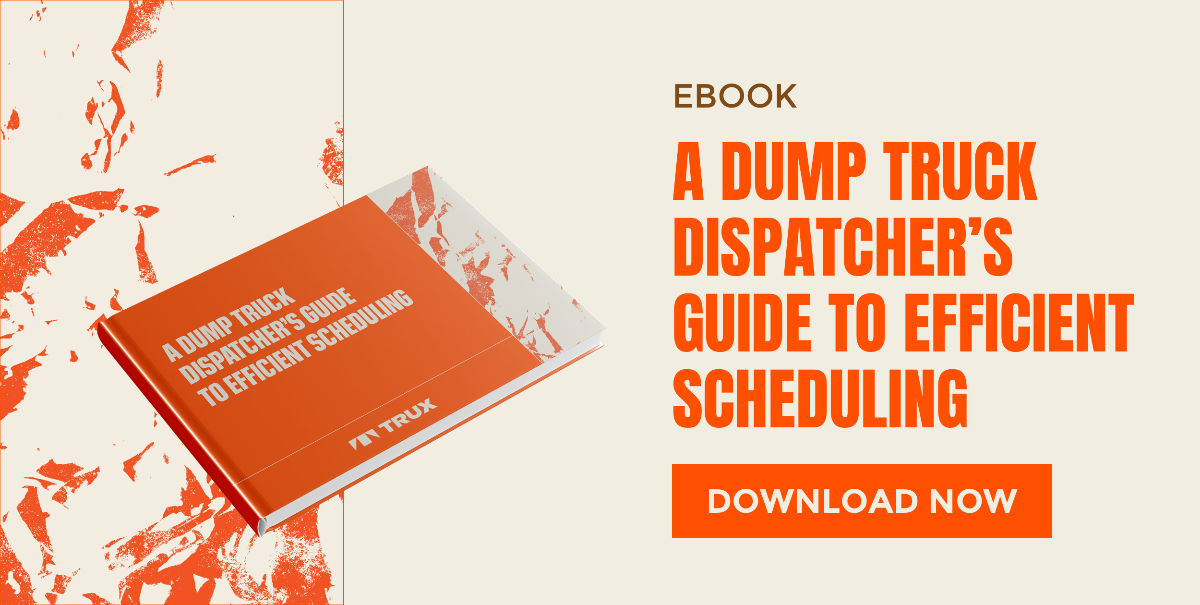6 min read
The Art of Communicating Effectively with Dump Truck Drivers For Fleet Dispatchers
By: TRUX Team on Mar 11, 2024 10:51:40 AM

Communication in fleet management plays a vital role in ensuring efficiency and safety. From dispatchers coordinating schedules to drivers updating progress, effective communication is key.
In this article, we emphasize the importance of establishing clear channels between all stakeholders, including understanding drivers' challenges. We talk about how leveraging technology like Trux streamlines processes, and creates a better overall workflow for your team. We also dive into the importance of encouraging feedback to strengthen operations and build trust between your dispatchers and the drivers working for you. Prioritizing clear communication and technology enhances efficiency, ultimately leading to improved outcomes and customer satisfaction.
Click a topic below to jump to the relevant section:
The Role of Communication in Fleet Management
Understanding the Driver’s Perspective
Leveraging Technology for Enhanced Communication
The Role of Communication in Fleet Management
Communication is an important part of almost every industry; construction is no different. When it comes to fleet management, communication is is a two-way street with both both dispatchers and haulers playing a role. For dispatchers, communication is core to your daily responsibilities. Haulers need to know where and when they are needed for the day, what material they are hauling, and for whom. Haulers, in turn, must communicate with dispatch and fellow haulers to alert them of job progress, issues on the route and/or with equipment, and changes to the job that your coworkers need to be made aware of.
Both ends of these communication channels are essential for fleet management to be effective, but these aren’t the only places clear communication is essential; we also need communication channels between dispatch, the hauler, and the customer/ site manager. Without effectively communicating with those parties outside of your own company, you may lose visibility into essential aspects of the job, and you can run into issues during the delivery with the site not being ready for truck arrival or the need for more, less, or even different material for the job.
While understanding that clear communication is important on the job, it is also important to remember that outside factors can lead to these lines of communication breaking down or not working as intended. Trux can assist in these communication channels and make effective communication easier for everyone.
Understanding the Driver’s Perspective
While clear communication is the responsibility of everyone involved with the job it is important to understand the limitations of each person involved. Dispatchers have many things to handle when it comes to their side of the job, and they need to make sure every hauler they are responsible for has the proper instructions for the day. Still, it is also important for them to understand the day-to-day challenges that the drivers face and how that might impact their ability to communicate and perform their jobs throughout the day.
Drivers are responsible for a lot of information, starting before they even get to the job site. From the minute they receive the job details, they need plan the day's route, ensure their truck is in proper shape to run the job, and ensure they have a point of contact at the delivery site.
Having an understanding of everyone's responsibilities when it comes to a job allows for clearer communication and a better understanding of the needs of each contact point. Being an active listener and having empathy for each other leads to better outcomes. If you can understand the information needed and communicate it efficiently, you can help make someone’s job easier and have the whole project run more efficiently, saving time, money, and frustration. For example, as a dispatcher, communicate the day’s responsibility to a driver as early as possible, allowing him to prepare for the day more effectively and with more time to make adjustments. As a driver, make sure you update dispatch and the customer with any delays or issues you might run into so that adjustments can be made to keep the job moving. As a customer, make sure you effectively communicate your needs for the job, where you want the material, how much you need, and if any changes to location and volume come up.
With Trux, dispatchers can easily communicate with their whole fleet of trucks, drivers can send their location and updates automatically without needing to pick up a phone, and customers can reorder material without even calling dispatch. These are a few examples of how you can make communication points easier on your daily projects, taking all of the involved parties into account.
Clear and Concise Messaging
When it comes to effective communication, it is important to remember that “short and sweet” is best practice. Make sure that you are giving out the information that matters and not getting bogged down by too much unnecessary information that could make communication slower and more confusing. While conciseness is important, it is also important to make sure the information is complete and makes sense to the person receiving it. This means that while shorthand and abbreviations may make communication quicker, it could confuse some people and end up costing you more time in the long run. When communicating, try only to use universal abbreviations if necessary, and make sure that you don’t skimp on details that could be important to the customer, dispatcher, and or driver.
Leveraging Technology for Enhanced Communication
Looking at the world around us, we can see many examples of technology making our lives simpler. So why not add fleet management technology that can help make communication more accessible and more efficient for your fleet? With Trux, you can send every truck you hire all of the information they need to complete the job successfully, including job locations, material, and job site contact information. You can communicate with haulers working for you directly from within the Trux platform, allowing you to choose individual haulers or every hauler on a job to update them with direct message updates about the current job or upcoming changes.
Besides the ease of access to information, Trux also gives your team access to real-time tracking data. (that can even be shared with your customers) Access to tracking data cuts down on the need to reach out to haulers throughout the day to get updates on location, status, and how much progress they have made on their jobs throughout the day. With Trux, you get all the information you need about a job updated as the day goes on, like loads completed. By having live access to this information, you can cut down on phone calls and focus on what matters most: hauling material.
Conclusion
It's clear that effective communication is absolutely essential for successful fleet management. From ensuring haulers have their daily tasks sorted to drivers keeping dispatch in the loop, every conversation counts. But it's not just internal chatter; talking to customers and site managers is equally crucial.
Understanding everyone's point of view and challenges helps us all communicate better. Active listening and empathy make everything run smoother. Tools like Trux can help streamline communication, making things easier for everyone involved.
Encouraging drivers to share their thoughts and providing ways for feedback improves operations and builds trust within the team. Trust is key in keeping communication channels open and transparent.
Building strong relationships with drivers means showing them respect and support. By keeping communication lines open, using technology wisely, and fostering trust, fleet management can run like a well-oiled machine, saving time, money, and headaches in the process.
Learn more about how Trux can help improve communication and efficiency in our eBook.
Frequently asked questions
Q: Why is understanding the driver's perspective crucial for effective communication?
A: Understanding the driver's perspective allows dispatchers to address concerns proactively, fostering empathy. This leads to more effective communication, as dispatchers can tailor their messages to resonate with drivers, ensuring clarity and reducing misunderstandings.
Q: How can technology enhance communication between dispatchers and drivers?
A: Technology facilitates real-time tracking and communication, like fleet management software and instant messaging platforms. This ensures timely exchanges of information, immediate feedback, and swift issue resolution, leading to smoother fleet operations.
Q: Why is building trust important in communication with dump truck drivers?
A: Trust encourages open dialogue, allowing drivers to voice concerns without fear. When drivers trust dispatchers, they're more likely to follow instructions and provide honest feedback, which is essential for improving fleet operations and ensuring safety.
Related Posts
Streamlining Dump Truck Logistics: Mastering Dispatch Orders and Tracking Tools
Efficiency in the dump truck industry hinges significantly on maintaining clear and concise...
Fleet Management Industry Trends and Emerging Technology to Watch
Effective fleet management impacts dump truck owners, contractors, brokers, and material suppliers....
A Digital Marketplace and Apps for Dump Truck Fleet Owners | Trux
Summer’s here, no doubt about it. All across the country, it’s hot--and we’re not just talking...

